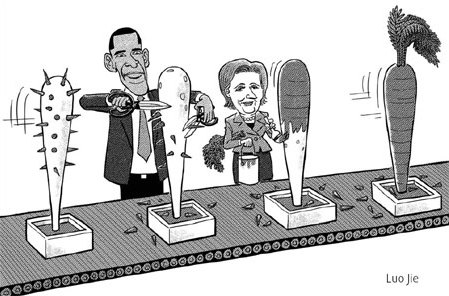
|
OPINION> Commentary
 |
|
US to offer more carrots, fewer sticks abroad
By Cai Hong (China Daily)
Updated: 2009-03-12 07:46 US Secretary of State Hillary Rodham Clinton has been busy mending fences with the rest of the world. She has traveled widely to East Asia, the Middle East and Europe since taking office last month, after the Bush administration left a slew of diplomatic problems. The US is now actively rebuilding its image overseas. In a new foreign policy based on "smart power", the Obama administration wants to stress diplomacy and development as much as defense to revive the US standing in the world. The "preliminary conversations" between the US and Syria last week represent an apparent softening of US policy toward a country the US sees as a linchpin for peace in the Middle East. The US dispatched Dan Shapiro of the White House's national security council and Jeffrey Feltman, the State Department's top Middle East diplomat, to Syria. With Washington seeking to "reset" relations with Russia, NATO announced it would restore full diplomatic ties with Moscow. Although "reset" was misspelled as "overcharge" in Russian on the symbolic gift - a red button - Clinton gave her Russian counterpart Sergei Lavrov, the gift underscored the US's friendly gesture. The Obama administration moved closer to resuming diplomatic contact with Iran as Clinton proposed an international meeting on Afghanistan on March 31 that could include "key regional and strategic countries". In that case, it would bring US officials face to face with their longtime adversaries. In the past eight years the Bush administration had isolated the US from the rest of the world, relying on its hard power. This kind of power includes guns, bombs, tanks, Humvees, Hueys, M16s, all about blood and guts. Now things seem to have gone the other way, toward smart power. The kind favored by Hillary Clinton. In her opening statement at her confirmation hearing before the Senate Foreign Relations Committee as the Secretary of State-designate, she said "we must use what has been called smart power, the full range of tools at our disposal - diplomatic, economic, military, political, legal, and cultural - picking the right tool, or combination of tools, for each situation. With smart power, diplomacy will be the vanguard of our foreign policy." Her words remind us of soft power, the kind preferred by certain thinkers and political scientists, including the most prominent Joseph S. Nye, Jr, the Sultan of Oma Professor of International Relations at Harvard. The power derives from movies, books, songs, ideals, diplomacy and moral authority. All about hearts and minds. Clinton believes in the ancient Roman poet Terence's declaration that "in every endeavor, the seemly course for wise men is to try persuasion first". Phew! She wants to prove she is a wise woman. Clinton will use all the tools of power in concert to reverse the trajectory of American decline.
 She and her staff face what one of her predecessors calls "trench warfare" to win all the funds needed to carry out the wholesale overhaul of US foreign policy, or much vaunted powers of persuasion. Former secretary of state Colin Powell, a leading senator and other public figures warn it will be especially hard to persuade lawmakers to double foreign aid when voters are losing sleep over the worst economic crisis in 70 years. Obama's US$ 3.55 trillion budget provides the State Department and other international programs US$ 51.7 billion, a US$ 3.5 billion rise on the current year. Washington seeks to build its credibility in the world to pay its bills to the United Nations and international organizations. But the Department of State will have a hard job winning over Congress and the American people. In the words of Colin Powell, who served for both George Bush senior and junior, "The American people still think that foreign assistance, development assistance, is something we just give away to the rest of the world with no return on investment." Robert Menendez, a leading advocate for foreign assistance in the Senate, said boosting living standards abroad creates new markets for US goods and services as well as fostering stability and reducing the need for military intervention. Last week the Center for US Global Engagement released "Putting Smart Power to Work: An Action Agenda for the Obama Administration and the 111th Congress." It distills more than 20 recent reports on revitalizing America's civilian capacity in global affairs into seven priority actions for President Obama and Congress to consider for successfully implementing a "smart power" approach to global engagement. Smart power is thought to be a deft combination of bullets and ideas used to get others to do what you want. Smart power replaces the lineal trade-off model of hard power, or the threat or actual use of bullets or other armed military force, with soft power, or the power of ideas, at the other end of the scale. Too much force has only created or encouraged more enemies. Throughout the Cold War, the US projected an image of vast technical competence. It sent humans to the moon and helped eradicate smallpox. Later, the nation's military operations in Kuwait in 1991 and Kosovo in 1999 demonstrated its towering technical proficiency. But in the past eight years, the US projected a very different, or to be more exact, bullying image. Now the domestic reality in the US asks for wiser policies abroad. It would simply be the smart thing to do. Smart power could start to make a difference. But it will not solve all of the US' problems if it shows no respect for other countries and recognizes their legitimate interests in their regions. While the new administration has extended a hand, it remains to be seen if others will accept it. (China Daily 03/12/2009 page10) |